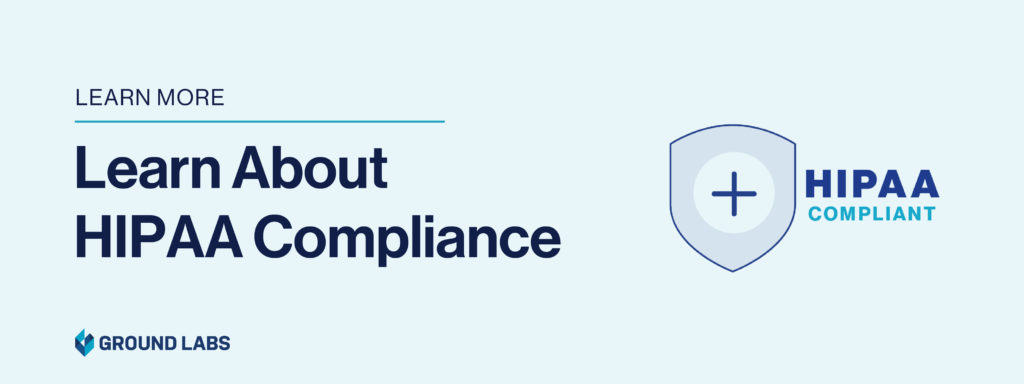Due to the increasing modernization of the healthcare system and the cutting edge technology that supports the industry, it’s critical that protected health information (PHI), like names, addresses, phone numbers, and social security numbers, remains secure. While new technologies allow for advancement and efficiency, it also puts this sensitive information at a higher risk for data breaches and unauthorized entities accessing confidential information.
Now, more than ever, healthcare organizations need to be hyper-aware of the data they are collecting and make sure they are properly adhering to security measures.
What is HIPAA Compliance?
Enacted in 1996, The Health Insurance Portability and Accountability Act (HIPAA) is an outlined set of rules that healthcare organizations need to follow and implement to protect the privacy, security, and integrity of PHI. Regulated by the Department of Health and Human Services (HHS) and the Office for Civil Rights (OCR), organizations that manage PHI must have specific security, network, and process measures in place to protect this information.
What are the HIPAA privacy & HIPAA security rules?
There are four essential tenements of the law that health care organizations and their associates need to take into account to maintain HIPAA security compliance:
HIPAA Privacy Rule
The HIPAA Privacy Rule protects a patient's privacy while allowing the transmission of health information when necessary.
HIPAA Security Rule
The Security Rule applies directly to PHI that is transmitted electronically, also known as ePHI. In order to be HIPAA compliant, organizations need to maintain strict security measures for protecting this electronic information. All ePHI created should be received, maintained, and transmitted confidentially and should be accessible and usable by authorized personnel only.
HIPAA Breach Notification Rule
The Breach Notification Rule states that when a data breach of PHI occurs, involved personnel must provide written notice to affected individuals without reasonable delay, and no later than 60 days from the discovery of the breach.
HIPAA Omnibus Rule
The HIPAA Omnibus Rule is an addendum to HIPAA regulation that was created in order to apply HIPAA to business associates. It mandates that business associates must be HIPAA compliant and outlines the rules surrounding Business Associate Agreements (BAAs).
Who needs to be HIPAA compliant in 2021?
Under HIPAA, the following two types of organizations need to maintain compliance:
- Covered Entities: Any organization that collects, creates, or transmits PHI electronically. This often includes healthcare providers, health care clearinghouses, and health insurance providers.
- Business Associates: Defined by HIPAA regulation as any organization that manages, transmits or comes into contact with PHI in any way over the course of work it has been contracted to perform on behalf of a covered entity. Since there are many hands involved within the healthcare systems, there is a wide array of business types that are covered under this rule. Some examples of business associates include:
-
- Billing Companies
- Third-Party Consultants
- EHR Platforms
- MSPs
- IT Providers
- Faxing Companies
- Shredding Companies
- Physical Storage Providers
- Cloud Service Providers
- Email Hosting Services
- Accountants
- Lawyers
There are many touchpoints, organizations, and personnel that come into contact with PHI. Take the time to assess how your own organization handles the PHI they come in contact with and the current compliance protocols you may or may not have in place to protect your patients’ sensitive information.
Tips for maintaining HIPAA and PHI compliance
Beyond introducing a risk management plan, training employees, and restricting third-party access, your organization should implement best practices and specific precaution and protection measures for maintaining HIPAA security compliance:
Implement Physical Safeguards Specific to HIPAA:
- Control who has access to the physical workstation where ePHI is stored to prevent unauthorized physical access, tampering, and theft.
- Create policies for covered entities and business associates about use and access to workstations and related media, including transferring, removing, disposing, and re-using electronic media.
- Maintain policies for how ePHI data is removed from mobile devices if an individual leaves the organization or the device is resold.
- Manage an inventory of hardware containing ePHI, with a record of movement and relocation of hardware.
Provide Technical and Data Protection for Healthcare Organizations:
- Allow only authorized personnel access to ePHI through unique user IDs or PIN codes.
- Devices must have the functionality to encrypt messages when they are sent and decrypt messages when they are received.
- Implement activity logs and audit controls to record what is done with ePHI data once it is accessed.
- Facilitate automatic logoffs of devices to prevent unauthorized device use if it is left unattended.
- Protect against unauthorized public access of ePHI, including all methods of transmitting data through email, internet, private network, or private cloud.
It’s important to ensure the security and compliance of PHI to maintain the trust of your patients as well as avoid hefty fines. It’s also important to maintain a reliable and credible partnership between covered entities and their business associates.
By instituting these regulations and policies, organizations will gain greater visibility and control of sensitive data. Once an organization has its HIPAA compliance policies in place, they must determine how to best enact those policies both efficiently and securely. And it begins with data discovery.
Ensure HIPAA compliance with Ground Labs’ Enterprise Recon
At Ground Labs, we understand that safety and patient trust is a top priority for organizations. Our new and improved Enterprise Recon 2.1 is our trusted solution that organizations can use to find and remediate sensitive information across a range of structured and unstructured data. Whether information is stored on your organization’s servers, employee devices, or in the cloud, Enterprise Recon, powered by GLASS™ Technology, enables the quickest and most accurate and seamless data discovery.
In compliance with HIPAA, GDPR, PCI DSS, CCPA, PDPA, LGPD, and other data security standards, including information relating to gender, ethnicity, health, and finances, Enterprise Recon allows your organization to operate efficiently with these compliance abiding features:
- Identifying more than 300 data types including predefined and variants
- Data Remediation
- InterSystems Cache support
- OCR and Audio Scanning
- API Framework
- Custom BI Reporting API
- Investigate Page for deeper-level browsing
- Data Classification
- Delegated Remediation
- Risk Scoring
With ever-evolving technology, especially in the healthcare sector, it’s important to anticipate security risks before they occur. An organization needs to ensure they are implementing security measures to protect against data breach and HIPAA violations. Ground Labs helps facilitate HIPAA security compliance by ensuring the ability to quickly discover, remediate, and report on data that can help mitigate potential security issues.
Ready to learn more about how to maintain HIPAA compliance with Enterprise Recon? Schedule a demo today.
Related Resources:

